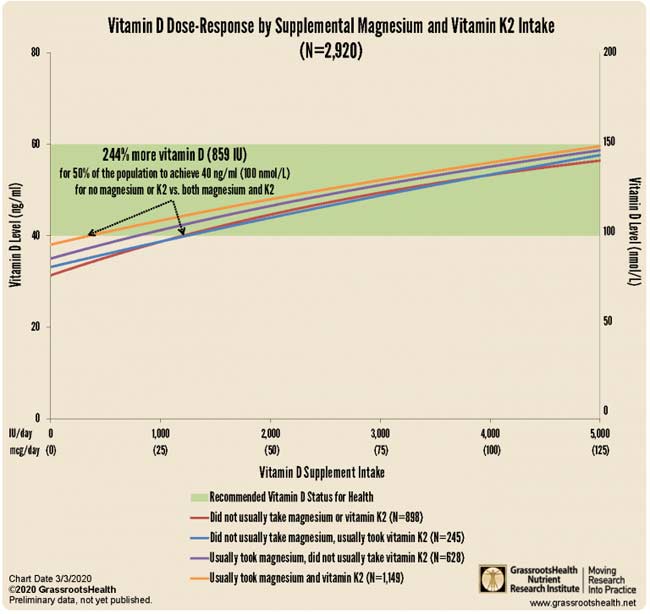Magnesium and K2 Optimize Your Vitamin D Supplementation by Dr. Joseph Mercola for Mercola
Optimizing your vitamin D level is ideally done through sensible sun exposure. However, many simply are unable to obtain sufficient levels from the sun alone and need supplemental vitamin D. In this case, nutritional synergies become an important factor.
According to research by GrassrootsHealth,1 “combined intake of both supplemental magnesium and vitamin K2 has a greater effect on vitamin D levels than either individually,” and “those taking both supplemental magnesium and vitamin K2 have a higher vitamin D level for any given vitamin D intake amount than those taking either supplemental magnesium or vitamin K2 or neither.”
You Need 2.5 Times More D if Not Taking Magnesium and K2
GrassrootsHealth is a nonprofit, independent public health research institute that has been conducting large-scale population-based nutrient research since 2007.2 While a significant focus is on vitamin D, the organization has also branched into other nutrients.
Its D*action project includes a global cohort of over 10,000 self-subscribed individuals who, anonymously, provide information about their supplement use and overall health status.
GrassrootsHealth research shows blood levels in the range of 40 nanograms per milliliter to 60 ng/ml (100 nanomoles per liter to 150 nmol/L) are safe, effective and will lower overall disease incidence and health care costs.3
That said, other nutrients have been shown to work synergistically with vitamin D, and being deficient in them can significantly influence your vitamin D status as well. Importantly, data from nearly 3,000 individuals reveal you need 244% more oral vitamin D if you’re not also taking magnesium and vitamin K2. As reported by GrassrootsHealth:4
“… 244% more supplemental vitamin D was needed for 50% of the population to achieve 40 ng/ml (100 nmol/L) for those not taking supplemental magnesium or vitamin K2 compared to those who usually took both supplemental magnesium and vitamin K2.”
What this means in practical terms is that if you take all three supplements in combination, you need far less oral vitamin D in order to achieve a healthy vitamin D level.

How Magnesium Affects Vitamin D
I’ve previously written about the importance of taking vitamin K2 when you’re taking high-dose supplemental vitamin D to avoid complications associated with excessive calcification in your arteries. In fact, relative vitamin K2 deficiency is typically what produces symptoms of “vitamin D toxicity.”
That said, magnesium is also a crucial part of the equation, as it is a component necessary for the activation of vitamin D. Without sufficient amounts of it, your body cannot properly utilize the vitamin D you’re taking.5,6,7,8
This actually helps explain why many need rather high doses of vitamin D to optimize their levels — it could be that they simply have insufficient amounts of magnesium in their system to activate the vitamin D. As noted by Mohammed Razzaque, professor of pathology at Lake Erie College of Osteopathic Medicine in Pennsylvania:9
“People are taking vitamin D supplements but don’t realize how it gets metabolized. Without magnesium, vitamin D is not really useful. By consuming an optimal amount of magnesium, one may be able to lower the risks of vitamin D deficiency, and reduce the dependency on vitamin D supplements.”
According to a scientific review10,11 published in 2018, as many as 50% of Americans taking vitamin D supplements may not get significant benefit as the vitamin D simply gets stored in its inactive form, and the reason for this is because they have insufficient magnesium levels.
Research published in 2013 also highlighted this issue, concluding that higher magnesium intake helps reduce your risk of vitamin D deficiency by activating more of it. As noted by the authors:12
“High intake of total, dietary or supplemental magnesium was independently associated with significantly reduced risks of vitamin D deficiency and insufficiency respectively.
Intake of magnesium significantly interacted with intake of vitamin D in relation to risk of both vitamin D deficiency and insufficiency … Our preliminary findings indicate it is possible that magnesium intake alone or its interaction with vitamin D intake may contribute to vitamin D status.”
Similarly, GrassrootsHealth has found13 you need 146% more vitamin D to achieve a blood level of 40 ng/ml (100 nmol/L) if you do not take supplemental magnesium, compared to taking your vitamin D with at least 400 mg of magnesium per day.




